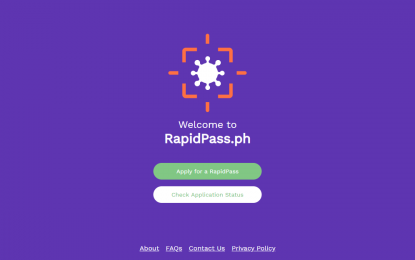
MANILA – Front-liners or those working to provide essential services will soon be able to pass through checkpoints quicker following the launch of the RapidPass system in the National Capital Region (NCR).
In a virtual presser on Friday, several government officials and partners in the private sector introduced RapidPass which would allow its users to quickly pass through RapidPass checkpoints through the use of a QR code or an alphanumeric code for verification, allowing for minimal contact with checkpoint personnel.
“Itong RapidPass system ay na-conceptualize para makatulong mabawasan ang person to person contact at mapabilis ang pag-check ng vehicles ng mga nagawa ng vital services, dun sa mga checkpoints (The RapidPass system was conceptualized to help minimize person to person contact and hasten vehicle checks for those working in vital services),” Cabinet Secretary Karlo Nograles said.
He said the service, which will be rolled out on Monday (April 6), will initially be available to those already approved by the Department of Trade and Industry (DTI) as part of a skeletal workforce or working in essential services, or those given media passes by the Presidential Communications Operations Office (PCOO).
“Media, manufacturers, sila na nabibigyan na po ng accreditation ng DTI and other agencies—sila po ang unang gagamit ng RapidPass system natin (Media, manufacturers, those accredited by the DTI or other agencies—they will be the first ones who will make use of the RapidPass system),” Nograles said.
The system will be available in all 56 checkpoints in NCR, he said, but will be first rolled out in the busiest checkpoints, such as the one at the Marikina-Marcos Highway.
While other essential front-liners, such as medical workers and those transporting essential goods, will be allowed to apply for a RapidPass through the website rapidpass.ph, he said such individuals were already allowed to pass through checkpoints with minimal interference and would not need a RapidPass.
He said that while RapidPass was not mandatory and will only last until the end of the enhanced community quarantine in Luzon, those with QR codes or alpha-numeric codes will enjoy quicker and safer access through checkpoints.
“What it will give every holder is faster pass-through at checkpoints as they can use RapidPass lanes,” Nograles said.
Aside from applying for the service through its website, Winston Damarillo, convenor of the DevCon Community of Technology Experts (DCTx) Philippines, said companies may also send a list or a spreadsheet containing data of their personnel that would need access through RapidPass checkpoints.
“Companies may send a list for approval and be added into the approved database upon verification,” Damarillo said.
Applicants already verified by government agencies or those included in a company list would be added into the RapidPass database in a matter of hours after submitting their applications, he said, with their RapidPass QR codes to be sent through email or alpha-numeric codes sent through SMS.
He said those with an individual or vehicle RapidPass may print out their QR codes or alphanumeric codes, or simply show their QR code to checkpoint personnel through a mobile phone.
Department of Science and Technology (DOST) Secretary Fortunato “Boy” de la Peña said the software was developed by non-profit group DCTx led by Damarillo, in cooperation with the DOST and the Department of Information and Communications Technology (DICT) and began on March 16.
He said the project currently only has a budget of PHP1 million for communications costs as the software was developed for free by volunteers from the DCTx, while 200 mobile phones to be used by checkpoint personnel were donated by PLDT.
DICT Assistant Secretary Emmanuel Caintic said vulnerability assessment and penetration testing of the software have been done as initial security tests, while the DICT will also ensure data privacy of the program’s users.